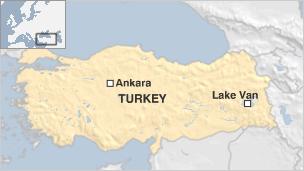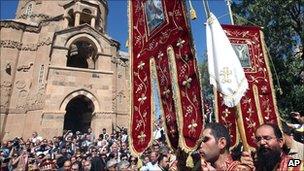Armenian Mass at church in Turkey
- Published
Sunday's service is the first at the church in 95 years
Armenian worshippers have held a service in a church in eastern Turkey for the first time in nearly 100 years.
The church, on an island in Lake Van, was damaged during the mass killing of Armenians during World War I.
It was restored by the government in 2007 and turned into a museum.
Turkey has allowed the Mass to take place in the hope it will be seen as a gesture of reconciliation, but some have denounced the move as a publicity stunt.
Many did not attend the service, complaining that the Turkish authorities had refused to place a cross on the roof of the building.

The cross was on display on a wooden pedestal at the church entrance on Sunday, and the authorities say it will be hoisted onto the dome at a later date.
And many Armenians also chose not to come, seeing the service as an inadequate step from a government which still refuses to acknowledge the mass killings of Armenians in this area as a genocide, says the BBC's Jonathan Head at the church.
Concession
Hundreds did travel from around the world to listen to the ancient Armenian Gregorian liturgy in the tiny 10th-Century church of the Holy Cross on Akdamar island.
However, numbers are much smaller than the local government had predicted.
For those who are there, it is a very moving occasion and they certainly believe that this is a positive step forward, our correspondent says.
This region of Turkey was once mainly populated by Armenians.

Turkey still tightly controls all forms of religious expression
Turkey still tightly controls all forms of religious expression, and the government is only taking timid steps, fearing a nationalist backlash if it is seen to be making too big a concession towards the Armenians.
Hundreds of thousands of Armenians died in mass killings and deportations by Ottoman Turk forces in 1915-16.
Armenia says 1.5 million people were killed in a genocide, but Turkey strongly rejects the charge, saying the number of deaths has been inflated and that the people died as a result of the strife of World War I.
- Published19 September 2010